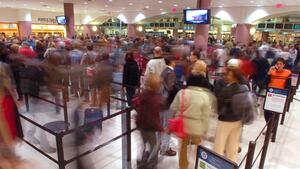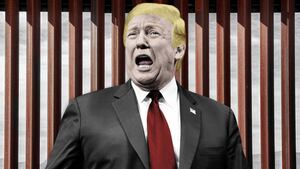BIG BEND NATIONAL PARK, Texas—While President Donald Trump refuses to reopen part of the federal government unless he gets his border wall, the shutdown has, in a twist of irony, contributed to an increase in illegal crossings.
In Big Bend National Park, which includes a roughly 100-mile stretch of the Rio Grande, the closure of a popular border crossing into a small Mexican village where many residents depend on American visitors for income, has prompted some Mexicans to cross illegally to sell crafts to the tourists on the U.S. side of the river.
“Right now there are no tourists but I still have a family that needs to eat,” said Boquillas del Carmen resident Felipe Gonzalez, who typically sells embroidered bracelets and bags on the Mexican side of the border and works as a guide.
Like many others, Gonzalez had ridden his horse across the river and left his collection of trinkets displayed on a rock with a donation jar in the morning and returned to collect his earnings in the evening. The trinket displays are a common sight along Big Bend hiking trails that hug the Rio Grande and typically include items such as walking sticks, beaded animal figurines, and cloth bags embroidered with the words “NO WALL.”
During regular operations, dozens of Big Bend visitors cross the Rio Grande daily via rowboat or wading shallow waters to explore the quaint Mexican town and spend money on guides, restaurants, and crafts. The crossing is susceptible to closures because it is manned by Big Bend law enforcement rangers who are considered “nonessential.” Re-entry to the U.S. is conducted by a virtual customs agent via telephone.
The timing of the shutdown, which began prior to Christmas, made matters worse as villagers are particularly dependent on the heavy flow of tourists during holidays.
“There’s absolutely no other form of income in Boquillas at all, so it’s completely shut the local economy down,” said Mike Davidson, who operates the rowboat concession.
Over the same 25-day period from December 2017 to January 2018, nearly 1,700 people paid the $5 fee to cross the river via rowboat into Boquillas, Davidson said. The number is a low estimate for the actual number of visitors as children under 7 years old cross for free and others chose to swim or wade across, he added.
Davidson said tourists typically spend $25 to $30 while in Boquillas and estimates the shutdown has cost the village more than $50,000—a huge amount for a low-income Mexican village. Davidson’s business alone has lost around $10,000 since the start of the shutdown, most of which would have gone to his seven Mexican boat operators.
“They depend 100 percent on tourism. It’s pretty devastating and it’s still not over yet,” he said.
That some would resort to crossing illegally to sell their crafts doesn’t surprise him, he said. “If they can sell a few things, it’s virtually the only income they could have.”
Due to the shutdown, Big Bend’s media relations department was not available to answer questions regarding the border crossing and the park superintendent did not respond to requests for comment.
An advisory posted on Big Bend’s website asks visitors not to purchase crafts on the U.S. side of the Rio Grande as doing so encourages illegal border crossings and “may result in the (merchant’s) arrest and deportation through Presidio (100 miles away). Additionally, they may be fined or incarcerated.” Instead, tourists may legally purchase items in Boquillas or at designated stores in the park, the message states.
Gonzalez, the Boquillas tour guide, said he’s not afraid of getting caught on U.S soil.
“It’s not like I’m doing anything wrong,” he said. “I’m just selling things to support my family.”
Gonzalez has many mouths to feed, including a wife, three daughters, two sons, two donkeys, one horse and one cow, he said.
Mark Nissen and Nicida Maerefat, who were visiting the park from Albuquerque, N.M., said they sympathized with Gonzalez and decided to purchase a “No Wall” bag.
“Now that the crossing is closed, I can understand that they’re losing quite a bit of sales,” Maerefat said.
Marcos Paredes, a former law enforcement ranger who patrolled the Rio Grande for 25 years prior to retiring in 2010, said the park has never had trouble with any of the Mexican vendors.
Like Davidson, Paredes said he was not surprised there would be an uptick in craft displays on the U.S. side.
Typically, there may be two or three stations set up, but on Saturday at least seven were visible along Rio Grande trails.
“Closing (the border crossing) off has really created a hardship for the people over there,” he said “They’re desperate for something, anything to make a little money.”
The recent government shutdown isn’t the first time Boquillas has been hard hit by the closure of the crossing. After 9/11 the federal government mandated the point of entry be shut down for security purposes and no one dared cross the river illegally as the border was heavily patrolled by officers who threatened trespassers with jail time, Paredes said.
By the time it reopened in 2013, the village was almost nonexistent.
“It was a ghost town,” Paredes said.
Boquillas residents rely on Big Bend and neighboring towns not only for the tourists they attract, but for groceries, gas and other services. The nearest major hub in Mexico—Muzquiz—is a four- to five-hour drive away.
The devastation caused by the 9/11 crossing closure was so crippling, Paredes was inspired to start a Christmas drive. Friends and family donate hams, toys and other gifts and Paredes, dressed as Santa Claus, delivers the items to the children of Boquillas.
This past Christmas, in anticipation of the shutdown, Paredes slipped into his Santa suit two days early and delivered four canoes worth of gifts to the town’s 60 families.
“It’s such a blow for them to get shut back down,” he said. “They had been recovering nicely.”








